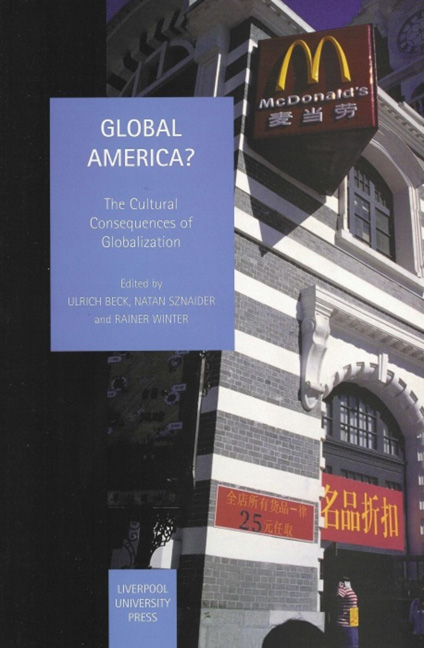Book contents
- Frontmatter
- Contents
- List of Contributors
- Acknowledgments
- Introduction
- PART I THEORETICAL PERSPECTIVES
- PART II NATIONAL CASE STUDIES
- PART III TRANSNATIONAL PROCESSES
- 8 Techno-Migrants in the Network Economy
- 9 The Americanization of Memory: The Case of the Holocaust
- 10 From the Lisbon Disaster to Oprah Winfrey: Suffering as Identity in the Era of Globalization
- 11 Global Media, Cultural Change and the Transformation of the Local: The Contribution of Cultural Studies to a Sociology of Hybrid Formations
- 12 ‘Rockization’: Diversity within Similarity in World Popular Music
- 13 The Internet: An Instrument of Americanization?
- PART IV EPILOGUE
- Rethinking Americanization
12 - ‘Rockization’: Diversity within Similarity in World Popular Music
from PART III - TRANSNATIONAL PROCESSES
- Frontmatter
- Contents
- List of Contributors
- Acknowledgments
- Introduction
- PART I THEORETICAL PERSPECTIVES
- PART II NATIONAL CASE STUDIES
- PART III TRANSNATIONAL PROCESSES
- 8 Techno-Migrants in the Network Economy
- 9 The Americanization of Memory: The Case of the Holocaust
- 10 From the Lisbon Disaster to Oprah Winfrey: Suffering as Identity in the Era of Globalization
- 11 Global Media, Cultural Change and the Transformation of the Local: The Contribution of Cultural Studies to a Sociology of Hybrid Formations
- 12 ‘Rockization’: Diversity within Similarity in World Popular Music
- 13 The Internet: An Instrument of Americanization?
- PART IV EPILOGUE
- Rethinking Americanization
Summary
This chapter argues that a large part of the popular music produced and consumed in the world today is made under the influence and inspiration of Anglo-American pop/rock – or, to be more precise, it is based on the adoption and implementation of what I call the rock aesthetic. Popular music thus epitomizes the new forms of cultural diversity associated with the globalization of culture – diversities based on cores of shared practices and technologies, and on logics of eclecticism and hybridity. The chapter traces the cultural logic of the process that made the rock aesthetic the core practice of popular music in the world, provides some examples and discusses their implications. I turn first to a brief theoretical contextualization.
The globalization of culture, as process and condition, is associated with the intensification, in the final decades of the twentieth century, of the centuriesold phenomenon of inter-cultural flow of meanings and materials. It is most strongly linked to the worldwide dissemination of commodities and meanings associated with the international culture industry (films, television series, popular music and the hardware gadgets for consuming these art forms), all types of industrialized food, fashion garments, cosmetics, cars, buildings and furniture, glossy magazines, and the advertisements for all these commodities. The emergence of a world culture is also associated with ‘domains of rationalized social life’ (Meyer et al. 1997), such as business, public administration, law, medicine and science. The permeation of nation states by some or all of these components has sometimes been interpreted by stressing its homogenizing effects. Concepts such as ‘Americanization’, ‘McDonaldization’ (Ritzer 1993) and ‘cultural imperialism’ (Mattelart 1979) imply that, in many aspects of life and culture, people and societies around the globe are becoming ‘the same’, with most elements of ‘sameness’ being either ‘American’ and ‘Western’ or filtered throughout the prism of these two cultural formations. Other interpretations tend to stress the changing nature of cultural diversity resulting from the globalization of culture. Concepts such as ‘mediascapes’ and ‘ideoscapes’ (Appadurai 1990), ‘cultural complexity’ (Hannerz 1992), ‘glocalization’ (Robertson 1995) and ‘cosmopolitanism’ (Beck 2000) have been employed to demonstrate that the world flow of cultural materials is multi-directional, not only from the West to the rest of the world; and that the same cultural materials are used and decoded differentially across and within countries.
- Type
- Chapter
- Information
- Global America?The Cultural Consequences of Globalization, pp. 222 - 234Publisher: Liverpool University PressPrint publication year: 2003



